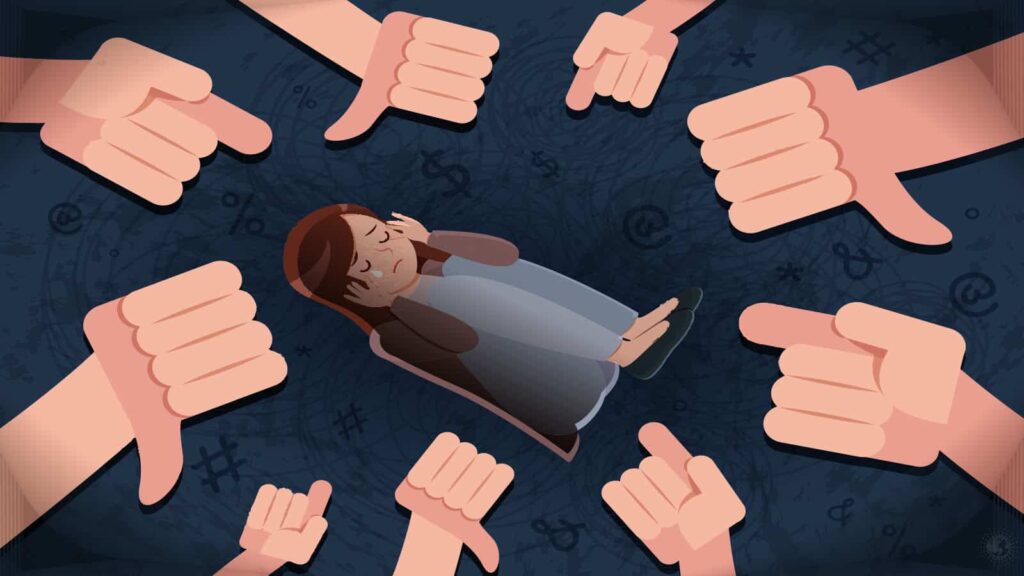Toxic friends are really exhausting. No cap!
Friends are very important. There is a saying ’No man is an island’, and that has repeatedly proven to be true. Friends are your family away from family and to be honest, they know you better than your family sometimes.
However, there are situations where you are better off without some ‘friends’.
Toxic friends are often pessimistic, hurtful, or manipulative within the relationship. While some may not be aware of their behavior, others are well aware and have no will to change.
Who is a toxic friend?
Friends tend to respect and encourage one another in healthy friendships. The relationship has a strong sense of trust to it.
Toxic friends, however, frequently come off as demanding and self-centered, especially when they don’t get what they want. They could have trouble communicating effectively and get hostile, passive-aggressive, or dismissive.
Additionally, they might depend on you for comfort or approval while engaging in a variety of attention-seeking behaviors.
Everyone has their moments, but toxic friends frequently stir up trouble and cause drama.
When you spend time with a toxic friend, you could frequently feel dissatisfied, insulted, or guilty.
These emotions may be crucial signs of an unhealthy interaction and a toxic friend.

SEE: 30+ Best Islamic Birthday Wishes and Duas For Your Muslim Friend
12 Sure Signs to Spot a Toxic Friend
They Tease or Insult You Regularly
Friends should encourage one another. And while the occasional bants might not be harmful, persistent insults are cause for concern.
In a friendship, you shouldn’t feel like you’re receiving unrelenting criticism.
Let your friend know how it makes you feel the next time they make fun of you. Genuine friends will retract their actions and apologize.
A toxic friend, however, will probably call you out on being overly sensitive, insinuate that you’re being dramatic, or constantly stress that it’s all in good fun.
Related: Friendship Breakups: Why They Happen and Hurt So Much
They Make Themselves The Victim Always!
It always seems like the universe is conspiring against them. At least in their eyes, nothing can go right.
It seems like toxic buddies are constantly experiencing problems. Even if the issues exist, they hardly ever make an effort to regulate their responses or make things better.
They frequently appear dependent and helpless as a result, which makes you feel worried, annoyed, or even resentful.

1. They Disrespect Your Boundaries
In any relationship, setting boundaries can be difficult, but good friends will make an effort to comprehend and respect your boundaries.
However, toxic friends frequently feel immune from your boundaries, especially when they require your assistance. They might even make you feel guilty for establishing such boundaries.
When you fail to put your intentions into action, you could also feel disappointed in yourself.
SEE: Red Flags In Relationships You Must Not Ignore
2. You Give Way More Than You Receive
There is never really a 50/50 partnership. However, you probably have a poisonous friendship if it looks like you’re usually the one lending your time, money, or other resources.
Instead of considering how they may improve the relationship, your friend might be taking advantage of your kindness. They might conclude that you don’t have a problem as a result.
Additionally, they could think they are simply entitled to receive what they desire, even if it comes at another person’s price.
3. You Love When Your Plans Get Cancelled

How do you cancel plans with a friend and the next thing you say is ‘Thank God’? When you can’t see your friend, it should worry you if you feel more relieved than sad.
But in general, you should wish to communicate with your guys!
You are probably beginning to tire of the friendship if you start to dread forthcoming events or if you continually come up with reasons why you can’t go.
RELATED: Birthday Prayer for a Friend
4. You Feel Trapped or Obligated to Be Their Friend
For the sake of their friendships, some toxic friends resort to emotional abuse.
The following are some typical indications of persistent emotional abuse in friendships:
- They make lighthearted remarks or jokingly threaten to harm themselves if you were not present.
- Often making fun of you (and making you think you’re being oversensitive).
- They exhibit contrasting behaviors between how you two behave in private and in public.
- Frequently transferring responsibility in an effort to make it appear as though you are at fault.
- Regularly put to the test for fidelity and devotion.
Related: How to Overcome Insecurities
5. They Are Not Trustworthy
Any good relationship requires trust.
If you know you can’t trust your “friend”, you presumably know at least to some extent that there is something toxic about them or the friendship.
Being unable to confide in someone because you can’t trust them — whether they betray you or can’t keep your secrets — is toxic because loyalty is important.
6. You Have Outgrown Them
Simply put, sometimes we outgrow people.
Even if your friend isn’t actively engaging in “toxic” behavior, the simple fact that you two have outgrown one another can encourage you to keep doing the same patterns or shrink yourself.
Our dynamics and what we value in friendships may change as we age. It’s alright to not feel guilty about having a long-time friend but not necessarily being close to them.
Related: Breakfast In Relationships: How To Serve It Well
7. One or Both of You Enable the Other
A very subtle sign of a toxic friendship is enabling. Enabling is giving someone the ability or means to carry out a task.
For instance, despite your desire to stop drinking, this friend incessantly invites you to go out for a happy hour with them. To be enabled by someone tends to “reinforce the powerless position” you already find yourself in.
So if either of you enables the other, it might be time to move on from that friendship.
READ ALSO: How To Practice Self-Love
8. They Do Not Empathize With You
At this point, it is quite important to state that empathy is a big deal! A toxic friend won’t be very good at providing a safe haven for your challenging emotions either.
These friends won’t care if you’re having a difficult time. Whether it’s by exhibiting toxic positivity or turning chilly once you’re upset, the “fair-weather” type of friend would try to “fast forward” through unpleasant chats to get back to having fun.
9. They Apologize Without Sincerity
When you confront them about their actions, they either dismiss your annoyance or offer a flippant “Sorry.”
They quickly respond with “I’m sorry you feel that way” or a confrontational “but” rather than taking the time to understand your viewpoint.
Talmabout “I’m sorry I offended you, but it was just a joke.”
This lack of remorse implies that the offender doesn’t really care how their behavior affects you.
SEE: Love Language: Types and Importance
10. Compare You to Other People
Do you have a friend that constantly criticizes you for not living up to their other friends’ standards? Maybe it’s less fun to hang out with you because your flat is smaller than X’s. Or you’d look cooler if you dressed more like Y.
A good friend would understand that each person has their own distinctive qualities and differences. They won’t make comparisons to other people or insinuate that you are somehow inferior to them.
You can be certain that they won’t force you to do anything against your better judgment.
Final Thoughts on Toxic Friends
Toxic friendships can have a way of impacting your mental health negatively. It can also make you feel ashamed and frustrated as it leaves you wondering if you are the problem.
Avoid criticizing yourself; chances are, you just want to be a nice friend and care about other people.
You can better understand your feelings and create a long-lasting plan for improvement by talking to other trustworthy friends or by seeking support from a therapist.





